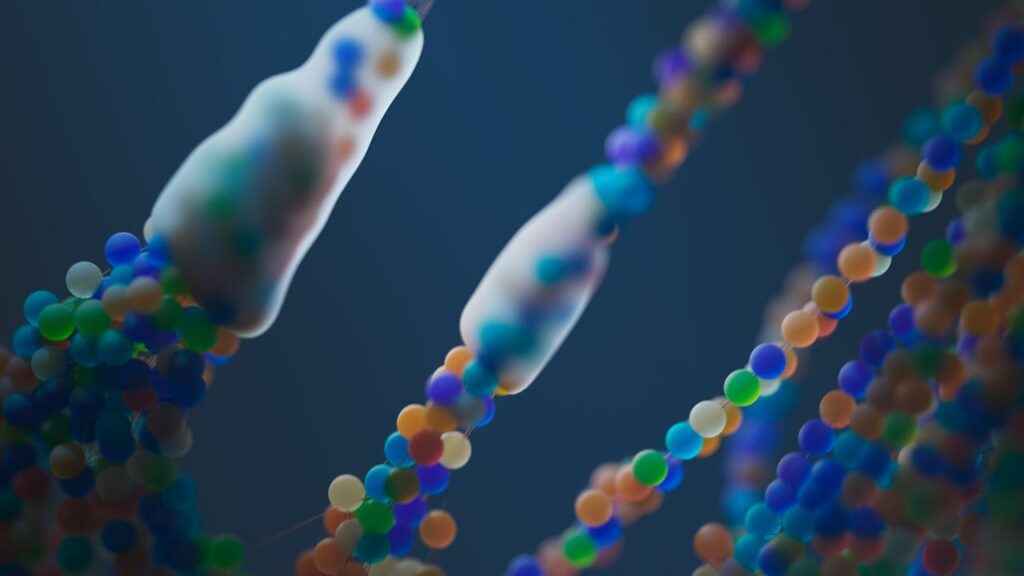A new study has found that prolonged use of high-THC cannabis leaves a unique mark on DNA, which may help identify users at risk of psychosis. The research highlights the potential of DNA methylation analysis to differentiate the impact of high-potency cannabis use, particularly in frequent users, and its implications for mental health, providing a possible tool for psychosis prevention.
Prolonged Cannabis Use May Leave a Unique DNA Signatures


A study published in Molecular Psychiatry suggests that cannabis use with high THC content, defined as having a THC concentration over 10%, leaves a distinct mark on DNA.
For more news like this, along with all the latest in legalization, research, and lifestyle, download our free cannabis news app.
Impact of Cannabis on DNA and Psychosis Risk
The research also shows that the effect of cannabis consumption on DNA differs between individuals experiencing their first episode of psychosis and those who have never experienced psychosis. This finding suggests that DNA blood tests could help identify cannabis users at risk of developing psychosis, potentially informing preventive approaches.
Marta Di Forti, the study’s lead author and professor of drugs, genes, and psychosis at King’s College London’s Institute of Psychiatry, Psychology & Neuroscience (IoPPN), stated: “Given the increasing prevalence of cannabis use and the growing availability of high-potency cannabis, it is crucial to better understand its biological impact, particularly on mental health.”
“Our study is the first to show that high-potency cannabis leaves a unique signature on DNA, related to immune system mechanisms and energy production. Future research should explore whether the DNA signature from current cannabis use, particularly from high-potency strains, can help identify users at higher risk of developing psychosis, whether in recreational or medicinal use contexts.”
Studying DNA Methylation and Cannabis Consumption
The researchers investigated the effects of cannabis consumption on DNA methylation, a chemical process detectable in blood samples that alters gene function (whether genes are turned on or off).
DNA methylation is a form of epigenetic change, meaning it affects gene expression without altering the DNA sequence itself. This process is seen as crucial in the interaction between risk factors and mental health.
Genome-Wide Analysis of DNA Methylation
The research team from the University of Exeter in the UK conducted complex analyses of DNA methylation across the entire human genome using blood samples from individuals who had experienced a first episode of psychosis and those without any psychotic experiences. The researchers examined the impact of current cannabis use, including frequency and potency, on the DNA of 682 participants.
The analysis revealed that frequent users of high-potency cannabis exhibited changes in genes related to mitochondrial and immune function, particularly the CAVIN1 gene, which could affect energy production and immune response. These changes are not explained by the well-known impact of tobacco on DNA methylation, which causes more significant damage than cannabis.
Distinct Molecular Marks on DNA of Cannabis Use
Emma Dempster, senior lecturer at the University of Exeter and the study’s first author, commented: “This is the first study showing that frequent use of high-potency cannabis leaves a distinct molecular mark on DNA, particularly affecting genes related to energy production and immune function.”
“Our findings provide important insights into how cannabis use can alter biological processes. DNA methylation, which links genetics and environmental factors, is a key mechanism by which external influences, such as substance use, affect gene activity. These epigenetic changes, shaped by lifestyle and exposures, offer valuable insight into how cannabis use may influence mental health through biological pathways.”
Data from Multiple Cohorts
Emma Dempster meta-analyzed data from two cohorts: the GAP study, involving patients with a first episode of psychosis at South London and Maudsley NHS Foundation Trust, and the EU-GEI study, which included patients with a first episode of psychosis and healthy controls from England, France, the Netherlands, Italy, Spain, and Brazil.
In total, DNA samples were available from 239 participants who had experienced a first episode of psychosis and 443 healthy controls representing the general population at the study sites.
Cannabis Use Patterns in the Study
Most cannabis users in the DNA study consumed high-potency cannabis more than once a week (frequent use) and had started using cannabis at an average age of 16.
In July 2023, another study of 1,000 adults had already linked cannabis consumption to epigenetic changes.
—
(Featured image by Google DeepMind via Pexels)
DISCLAIMER: This article was written by a third-party contributor and does not reflect the opinion of Hemp.im, its management, staff, or its associates. Please review our disclaimer for more information.
This article may include forward-looking statements. These forward-looking statements generally are identified by the words “believe,” “project,” “estimate,” “become,” “plan,” “will,” and similar expressions. These forward-looking statements involve known and unknown risks as well as uncertainties, including those discussed in the following cautionary statements and elsewhere in this article and on this site. Although the company may believe that its expectations are based on reasonable assumptions, the actual results that the company may achieve may differ materially from any forward-looking statements, which reflect the opinions of the management of the company only as of the date hereof. Additionally, please make sure to read these important disclosures.
First published in Newsweed, a third-party contributor translated and adapted the article from the original. In case of discrepancy, the original will prevail.
Although we made reasonable efforts to provide accurate translations, some parts may be incorrect. Hemp.im assumes no responsibility for errors, omissions or ambiguities in the translations provided on this website. Any person or entity relying on translated content does so at their own risk. Hemp.im is not responsible for losses caused by such reliance on the accuracy or reliability of translated information. If you wish to report an error or inaccuracy in the translation, we encourage you to contact us.



Comments are closed for this post.